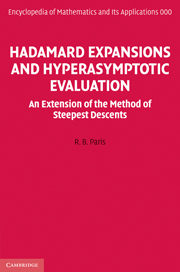Book contents
- Frontmatter
- Contents
- Preface
- 1 Asymptotics of Laplace-type integrals
- 2 Hadamard expansion of Laplace integrals
- 3 Hadamard expansion of Laplace-type integrals
- 4 Applications
- Appendix A Properties of P(a, z)
- Appendix B Convergence of Hadamard series
- Appendix C Connection with the exp-arc integrals
- References
- Index
1 - Asymptotics of Laplace-type integrals
Published online by Cambridge University Press: 05 March 2013
- Frontmatter
- Contents
- Preface
- 1 Asymptotics of Laplace-type integrals
- 2 Hadamard expansion of Laplace integrals
- 3 Hadamard expansion of Laplace-type integrals
- 4 Applications
- Appendix A Properties of P(a, z)
- Appendix B Convergence of Hadamard series
- Appendix C Connection with the exp-arc integrals
- References
- Index
Summary
In this opening chapter we present a detailed account, together with a series of examples of increasing complexity, of the classical method of steepest descents applied to Laplace-type integrals. Consideration is also given to the common causes of non-uniformity in the asymptotic expansions so produced due to a variety of coalescence phenomena. The chapter concludes with a brief discussion of the Stokes phenomenon and hyperasymptotics, both of which have undergone intense development during the past two decades. Such a preliminary discussion, as well as hopefully being of general interest in its own right, is necessary for the remaining chapters, since the Hadamard expansion procedure can be viewed as an ‘exactification’ of the method of steepest descents yielding hyperasymptotic levels of accuracy. Considerable space in the later chapters is devoted to showing how the Hadamard expansion procedure can be modified to deal with various coalescence problems.
Historical introduction
One of the most important methods of asymptotic evaluation of certain types of integral is known as the method of steepest descents. This method has its origins in the observation made by Laplace in connection with the estimation of an integral arising in probability theory of the form (Laplace, 1820; Gillespie, 1997).
- Type
- Chapter
- Information
- Hadamard Expansions and Hyperasymptotic EvaluationAn Extension of the Method of Steepest Descents, pp. 1 - 99Publisher: Cambridge University PressPrint publication year: 2011



